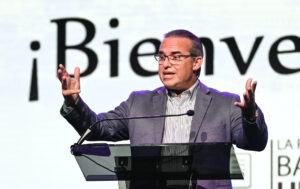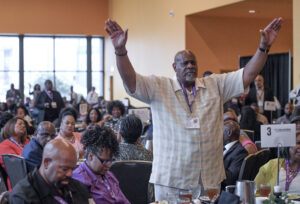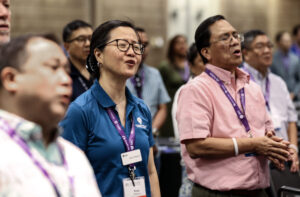
Lifeway Research released a report this month on Southern Baptists’ views on political theology. The survey, which was sponsored by the Land Center for Cultural Engagement at Southwestern Baptist Theological Seminary, looked at the views of Southern Baptist laity and key leaders and aimed to understand:
- the importance Southern Baptists place on various national issues
- their views on religious freedom
- their perspectives on the role of Christianity in government and public life
It also explored attitudes toward specific constitutional rights and the extent to which respondents believe Christian values should influence legislation and public policies. The study presents findings from online surveys conducted in January-February 2024 of 500 Southern Baptist laity members and 507 Southern Baptist key leaders*.
Below are some of the key takeaways about Baptist political theology from the report.
Conservative political leanings
A significant majority of respondents:
- identify as politically conservative (64 percent of laity and 90 percent of key leaders),
- are registered as Republicans (58 percent of laity and 75 percent of key leaders).
This correlates with their views on many issues including the government’s role in religion.
Opposition to government overreach in religion
The report found a strong consensus that the government should not favor any specific religion or dictate church attendance, underscoring a preference for a separation between church and state.
- More 90 percent also say religious liberty should apply to all religions.
- 58 percent of laity and 62 percent of key leaders believe the government should not favor any specific religion.
Importance of opposing abortion
The majority of both Southern Baptist laity and key leaders consider the issue of abortion to be extremely important.
- 74 percent of key leaders and 53 percent of laity categorized abortion as “extremely important.”
Skepticism toward climate change
There’s noticeable skepticism toward the urgency of climate change, reflecting traditional conservative viewpoints prevalent among the respondents.
- Only 20 percent of laity and 4 percent of leaders consider climate change to be extremely important.
Priority on parental rights in education
A majority of respondents believe in strong parental rights in education, showing a preference for policies that allow parents significant control over their children’s education.
- Slightly more key leaders (61 percent) found this issue to be “extremely important” (compared to 51 percent of laity).
Support for nonviolent resistance and scriptural obedience
A vast majority agree that Christians should pursue nonviolent resistance to unjust laws and should obey laws unless they directly conflict with God’s commands, as outlined in Scripture.
- Slightly more key leaders (61 percent) found this issue to be “extremely important” (compared to 53 percent of laity).
Cautious views on immigration and national defense
Issues like immigration and national defense are considered important, but opinions vary, often aligning with broader political and regional trends.
- Those with conservative political views (91 percent) are more likely to consider national defense “important/extremely important” than those with moderate political views (77 percent) and liberal political views (77 percent).
- Republicans (85 percent) and Independents (85 percent) are also much more likely to consider immigration to be “important/extremely important” than Democrats (58 percent).
Support for the public display of Christian symbols
Many respondents support legislation that would allow Christian symbols like the Ten Commandments in public schools, indicating a desire for more public expressions of Christian faith.
- Those with conservative political views (82 percent) are more likely to agree than those with moderate political views (50 percent) and liberal political views (47 percent) with the statement: “Every public school should post the Ten Commandments in their building.”
Role of Christianity in America’s founding
The majority believe that Christianity played a significant role in the founding of the United States, and this belief influences their views on national identity and policy.
- 64 percent of laity and 74 percent of leaders strongly agree.
Diverse influences on political and religious views
Respondents cite various influences on their political and religious views including personal experiences, family background and media consumption.
- Leaders were much more likely to state other influences – including the Bible – as a key influence compared to the laity (30 percent versus 8 percent).
Conclusion
Overall, the survey highlights the broad and complex landscape of political theology within the Southern Baptist community, highlighting a strong preference for traditional, conservative values that emphasize:
- religious freedom
- parental rights
- the influence of Christian principles on American governance and society
“These findings reinforce that Baptists in our pews generally hold historic Baptist beliefs about the role of the church and the state,” said Dan Darling, director of the Land Center for Cultural Engagement at Southwestern Baptist Theological Seminary. “Baptists desire robust engagement in the public square and strongly believe in a free church in a free state. This research should inform the discussions surrounding Southern Baptists, especially in a political season.”
(*For key leaders, invitations were emailed to the following roles: Associate Pastor, Minister of Music, Minister of Education, Minister of Youth, Minister of Children, Minister of Preschool, Other Minister, Church Secretary, Sunday School Director, WMU Director, Women’s Ministry Coordinator. Respondents were screened to exclude senior pastors.)
This article originally appeared at ERLC.com.
















